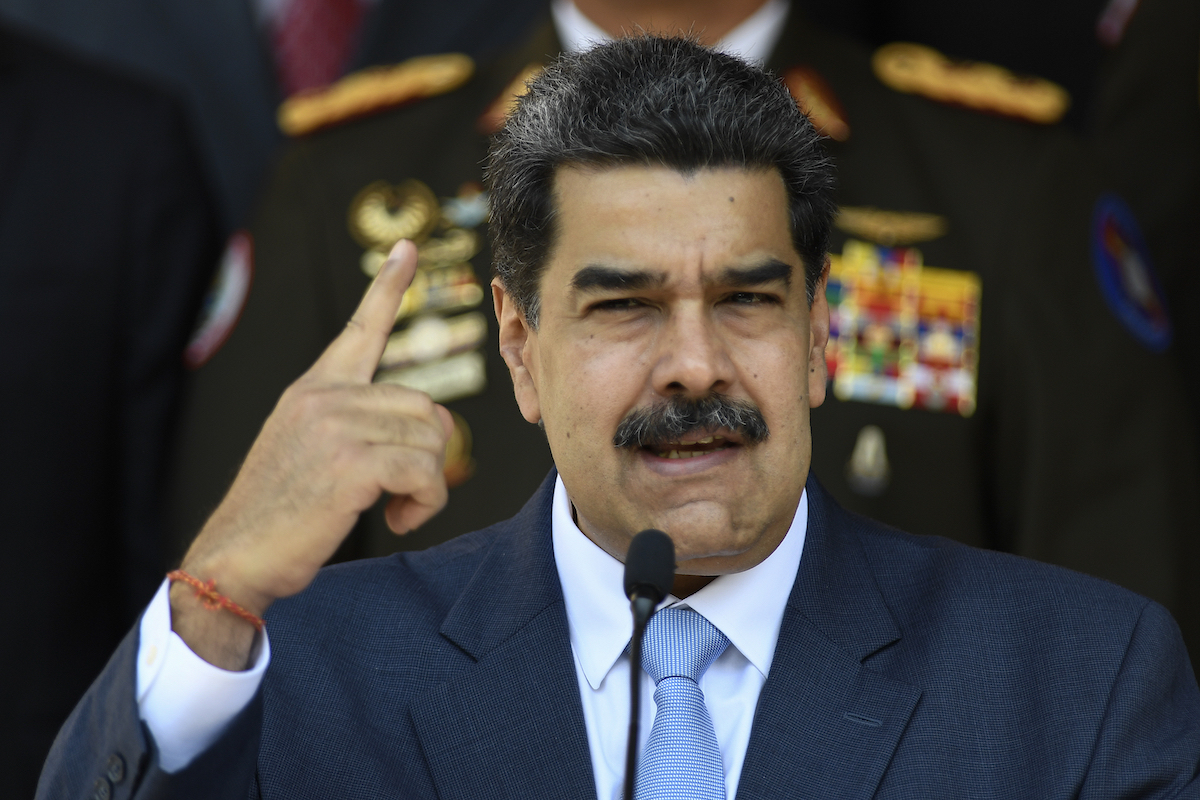

In this March 12, 2020 file photo, Venezuelan President Nicolás Maduro gives a press conference at the Miraflores presidential palace in Caracas, Venezuela. (AP Photo/Matías Delacroix, File)
By JOSHUA GOODMAN, Associated Press Writer
MIAMI (AP) — Venezuela on Saturday demanded the release of a government-connected businessman who was detained in Cape Verde on U.S. corruption charges, calling his arrest an illegal act of aggression by the Trump administration aimed at piling new hardships on the crisis-wracked oil nation.
Alex Saab’s arrest Friday while en route to Iran was a major blow to President Nicolás Maduro’s government. U.S. officials believe he holds many secrets about how the socialist leader, his family and top aides allegedly siphoned off millions of dollars in government contracts amid widespread hunger in the oil-rich nation.
It was unclear how American authorities, who had been targeting the Colombian businessman for years, finally caught up with him. The Justice Department declined to comment as did Saab’s American lawyer, Maria Domínguez.
A person familiar with the situation said the 48-year-old Saab was detained in the Atlantic Ocean archipelago when his San Marino-registered jet made a refueling stop on a flight to Tehran, where he was believed to be negotiating deals to exchange Venezuelan gold for Iranian gasoline. The person was not authorized to discuss the matter and spoke on condition of anonymity.
Flight tracking data shows the aircraft, which the once globe-trotting Saab had used in the past, departed Friday from Venezuela’s capital, Caracas.
Adding to the intrigue, a private jet belonging to Presidential Aviation, a U.S. government contractor, was standing ready for a chartered flight Sunday from Cape Verde to Miami’s private Opa Locka airport.
Venezuela’s government energetically protested the arrest of Saab, who it said was traveling on a Venezuelan passport and was on a “humanitarian mission” to buy food and medical supplies. In a statement issued Saturday night, it said an Interpol arrest notice for Saab wasn’t issued until a day after his detention, violating international norms and disregarding the diplomatic immunity he enjoys as an “agent of a sovereign government.”
It said it would initiate all legal and diplomatic actions to secure his release. But coronavirus restrictions frustrated an attempt by Maduro’s nearest ambassador, in Senegal, to travel to Cape Verde.
As the Trump administration seeks to regain momentum in its faltering campaign to oust Maduro and install opposition leader Juan Guaidó as Venezuela’s president, it is increasingly going after top officials and business people connected to the embattled leader. In March, it indicted Maduro and more than a dozen other individuals on narcoterrorist, corruption and other criminal charges.
Saab came onto the radar of U.S. authorities a few years ago after amassing a large number of contracts with Maduro’s government.
Federal prosecutors in Miami indicted him and a business partner last year on money laundering charges connected to an alleged bribery scheme that pocketed more than $350 million from a low-income housing project for the Venezuelan government that was never built.
Separately, Saab had been sanctioned by the Trump administration for allegedly utilizing a network of shell companies spanning the globe —in the United Arab Emirates, Turkey, Hong Kong, Panama, Colombia and Mexico— to hide huge profits from no-bid, overvalued food contracts obtained through bribes and kickbacks.
“Saab engaged with Maduro insiders to run a wide-scale corruption network they callously used to exploit Venezuela’s starving population,” Treasury Secretary Steven Mnuchin said at the time of the sanctions. “They use food as a form of social control, to reward political supporters and punish opponents, all the while pocketing hundreds of millions of dollars through a number of fraudulent schemes.”
In private, U.S. officials have long described Saab as a front man for Maduro although he is not identified as such in court filings.
The U.S. Treasury Department alleges some of Saab’s contracts were obtained by paying bribes to the adult children of Venezuelan first lady Cilia Flores—Yoswal, Yosser and Walter Flores. Commonly known in Venezuela as “Los Chamos,” slang for “the kids,” the three men are also under investigation by prosecutors in Miami for allegedly forming part of a scheme to siphon $1.2 billion from Venezuela’s state-owned oil company, two people familiar with the U.S. investigation told The Associated Press.
News of the possible arrest broke late Friday but initially officials in the U.S. and Saab’s native Colombia were skittish about discussing the matter. Cape Verde has no extradition treaty with the U.S. and fresh on officials’ minds is the 2014 saga involving another high priority Venezuelan target, the late Hugo Chávez’s longtime spy chief, retired Gen. Hugo Carvajal.
Carvajal was arrested in 2014 on the Caribbean island of Aruba, where he had been named Maduro’s consul, but managed to flee a U.S. drug warrant after intense diplomatic pressure from Caracas. Carvajal remains at large after having been jailed and later released in Spain.
Saab is believed to have expanded his reach into Venezuela’s vital oil industry as the OPEC nation’s economic crisis has deepened. Iran sent Venezuela several tankers of gasoline last month that government opponents say were purchased with gold and by shell companies controlled by Saab.
Last week, prosecutors in Colombia froze eight properties allegedly belonging to Saab, including a mansion in his Caribbean hometown of Barranquilla valued at more than $7 million, as part of their own money laundering investigation.
***
Associated Press writer Michael Balsamo in Washington contributed to this report.


